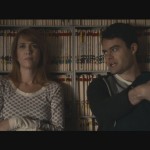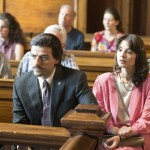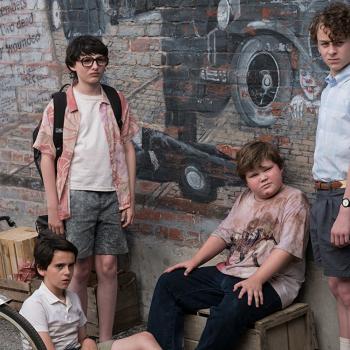Dee Barnes, who was once assaulted by Dr. Dre, wrote an important review for Gawker about the film’s revisionist history:
… Dr. Dre straddled me and beat me mercilessly on the floor of the women’s restroom at the Po Na Na Souk nightclub in 1991.That event isn’t depicted in Straight Outta Compton, but I don’t think it should have been, either. The truth is too ugly for a general audience. I didn’t want to see a depiction of me getting beat up, just like I didn’t want to see a depiction of Dre beating up Michel’le, his one-time girlfriend who recently summed up their relationship this way: “I was just a quiet girlfriend who got beat on and told to sit down and shut up.”
But what should have been addressed is that it occurred. When I was sitting there in the theater, and the movie’s timeline skipped by my attack without a glance, I was like, “Uhhh, what happened?” Like many of the women that knew and worked with N.W.A., I found myself a casualty of Straight Outta Compton’s revisionist history.
Violence against women is not ok. Inciting violence against police officers–however great the anger about real abuses–is not ok. Using a powerful and inventive American art form to incite suffering people to impulses and practices that will ultimately be self-destructive to them is not helpful. It’s not a legacy.
Now, does our entire nation need to own up to creating an environment in which there are few healthy, meaningful choices for inner city young men? Yes, we absolutely do. But at the same time, we don’t need to pretend that darkness is light.
As I reflected on Straight Outta Compton, I realized that it made me react emotionally much like another film, geared to a very different audience, did. I went to see American Sniper with a similarly open mind last year. I never wrote about it at the time because the culture war debate on it was pretty heated, and I didn’t really have anything new to add. But I think comparing the films side-by-side helps us to see how confusion of identity sneaks into film. Hero or villain? Instead of recognizing that most people have some of both in them, clear lines of demarcation are drawn. Biopics become hagiographies instead of bearing witness to real people that we recognize for their sheer humanness.
I go to see films for many reasons, but one of the main reasons is in an attempt to develop deeper empathy for those outside my realm of experience. Deeper … well … LOVE. Going to see American Sniper was my attempt to empathize with our soldiers, who face countless burdens and stresses each day … dangers that I cannot imagine. American soldiers volunteer to face the battlefield’s daily dangers. They come home changed forever by the pressure cooker of war. We owe it to them to listen to their voices. That’s what I wanted to do. But as I watched American Sniper, I found myself not only frustrated with the unconvincing performances and the uneven, noncohesive film style, but I was also disturbed by its view of the Iraqi people and its rationalization of civilian casualties. It could have been so much more, but its minimal self-critical awareness made it ineffective for me. The diminishing of its subject Chris Kyle’s dehumanizing comments about the enemy in war (well-known in the news, but less prominently featured in the film) reminds me of the revisionist history of N.W.A. in Compton. It’s too neat, too tidy. Real people are simply more interesting, be they war heroes or gangsta rappers–or anything else in between. Real people are a mix of good and evil, mess and beauty. They are complicated and trying and fiercely embodied.
Just as Sniper attempted to lionize Kyle, Compton did the same with its subjects. Its hagiography glossed over inadequacies of its subjects and refused to examine history with much of a critical eye. A willingness to open itself to the vulnerability of self-criticism would have made it a more interesting film, more layered and nuanced. The musical performances were strong, and the history was interesting, but the acting was only adequate (again, like Sniper). In the end I was left with a legacy of bravado and surface-level reflection. I didn’t feel that these rappers knew or understood themselves very well; that lack of self-knowledge translated to the screen and left me without a much-desired deeper understanding of them. I wanted to respect the film much more, but I left disappointed (just like Sniper).
Compton was worth seeing because I believe it’s important to listen to voices that speak outside our own experience. The film helped me to empathize with the rage of many black youth who live on the margins. But instead of letting me really know them, the subjects of the film placed a wall of posturing and bravado between us.
This film could have been a lot more than it was.
Photo source: IMDB.com
——————-
Community discussion guidelines:
Because this is a Christian blog, the things I’m talking about will obviously be topics that people feel strongly about in one direction or another. Please keep in mind that this is a place for substantive, respectful, constructive conversation. All perspectives are welcome to discuss here as long as all can treat each other with kindness and respect. Please ignore trolls, refuse to engage in personal attacks, try not to derail the conversation into divisive rabbit trails, and observe the comment policy listed on the right side of the page. Comments that violate these guidelines may be deleted. Vulgar remarks may result in immediate blacklisting. For those who clearly violate these policies repeatedly, my policy is to issue a warning which, if not regarded, may lead to blacklisting. This is not about censorship, but about creating a healthy, respectful environment for discussion.
P.S. Please also note that I am not a scientist, but a person with expertise in theology and the arts. While I am very interested in the relationship between science and faith, I do not believe I personally will be able to adequately address the many questions that inevitably come up related to science and religion. I encourage you to seek out the writings of theistic or Christian scientists to help with those discussions.
———————-












